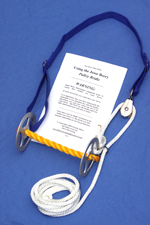“Does Your Horse React or Respond?”
Kenny Scott, one of our featured professional
trainers, has some great insight into horses
and discussed the difference between
Reaction vs. Responding when it comes to
handling your horse.
It’s weird.
The “possibility” of something happening to you
vs. it actually happening seems scarier.
Not sure why that is.
Perhaps it’s because our imaginations
run wild with the “what ifs”.
But did you know, horses are a lot
like this too?
Horses have a BIG imagination.
To see it, all you have to do is watch their
reaction when they see a plastic bag rolling
across the ground in front of them.
Years ago I was riding my horse behind
my house and she stopped.
She wouldn’t go forward either – not for all
the hay in the world.
Funny thing is, I couldn’t figure out
what was spookin’ her.
I knew something was but I couldn’t
see or hear a thing. Pretty typical. After
all, horses have way better hearing than we do.
Plus, their sight is designed like
radar. It’ll pick up little blips we miss.
Anyway, after I unsuccessfully tried
talkin’ my horse into going forward, I got off.
I couldn’t even get her to walk a
big circle around it.
And she wasn’t about to go forward
or anywhere near the direction we “were” going.
So I climbed off and walked her forward with me.
There’s something magical about that at times.
You can walk in front of your horse toward a spooky
object and they’ll often go with you – albeit still scared.
Anyway, as we got closer I could hear
a sound but couldn’t quite make it out.
We got a little closer and then I
could hear what sounded like wind – sort of.
Even closer, I discovered the headgate
was open the field was being irrigated.
The water rushing out from the canal to the
headgate was making a gushing sound.
That’s what seized my horse’s brain – the sound
of rushing water.
Funny thing is, I had to get a 100 feet closer to
it to even hear a faint sound from it.
She heard it WAY before I did.
And here’s the thing.
You and I know it was just water. We
were able to reason that.
She didn’t know what it was.
All she did was react.
Her imagination went wild because, in
her mind, “Who knows what that sound was.”
She was mostly concerned it was coming
to get her.
Now one reason I told you this is to
demonstrate how in-tune horses are to noise.
They are also sensitive to movement – but that’s
not my discussion today.
It’s the noise thing I wanna hit for a
minute.
When we filmed Kenny Scott, he was showing a very
green horse at the beginning of the DVD.
Kenny said there are times the horse stops and
when he does, you have to urge him forward.
http://HorseTrainingResources.com/dvd-kennyscott.html
And here’s the kicker.
If we have to urge him forward, we can create
a swat to the horse.
No,…we’re not hitting him.
Rather, we’re making a noise.
Remember my story about the headgate and the
canal and how horses are sensitive to noise?
You can use that as a tool to help work
with your horse.
As I said, horses respond to noise.
BUT!……
They “react” to pain.
We want our horse to respond…not react.
A broke horse is a response.
A scared horse is a reaction.
Make sense?
It’s one of those tricks you learn as you
keep working with horses and learn from others.
This particular one came from Kenny Scott as
I said earlier.
I urge you to read more about Kenny and his
methods if you haven’t already.
Go to:
http://HorseTrainingResources.com/dvd-kennyscott.html
Be careful when urging your horse forward with noise.
If he’s not used to it, you could get into a wreck.
So follow the rule of doing as little as you
need to…but as much as it takes.
http://HorseTrainingResources.com/dvd-kennyscott.html
Have a great week….. but do it safely.
Sincerely,
Charlie
P.S. There’s an old saying:
“What Can’t Be Cured Must Be Endured”
It sure is true with horses! You don’t have to
continue to “endure” the bad habits and misbehaving
your horse exhibits. Get started on the Jesse Beery
horse training course now and see how quickly you can
overcome all those problems you’re having with
your horses.
http://www.HorseTrainingResources.com/beery.html


